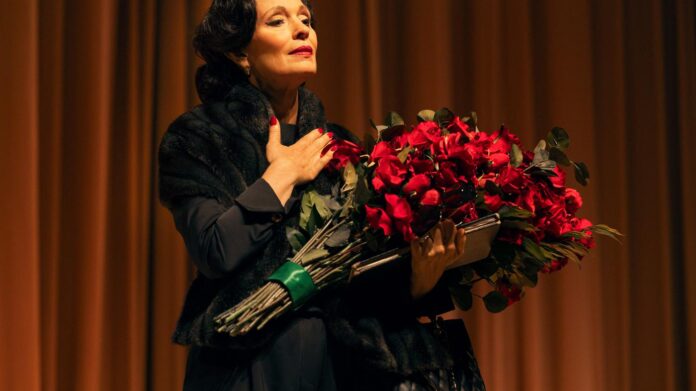Maria Callas has been to Berlin four times. The most famous is her performance as Lucia di Lammermoor in 1955 at the Theater des Westens, under the conductor Herbert von Karajan. Four years later, the soprano sang at the Titania Palace, followed by concerts at the Deutsche Oper and the Philharmonie in 1963 and 1973.
But Reinickendorf has never graced “La Divina” with its presence. Until now. As the reincarnation of the Greek woman born 100 years ago, Katja Weitzenböck is now playing the lead role in Terence McNally’s “Master Class” in the Ernst Reuter Hall. A lot of things fit together: the hall was opened a year after the “Berlin Lucia”, and the foyer has retained its original fifties charm, with a curved staircase, terrazzo floor and bag lamp mobiles.
The wood-panelled 725-seat hall, even without a stage set, offers exactly the atmosphere that is the focus of the play, which premiered in 1995: We, the audience, become the students of New York’s Juilliard School who absolutely want to be there when Maria Callas gives public singing lessons to a select few.
The diva wants a seat cushion
The diva, whose voice is already badly affected, describes her charges under Terrence McNally as “victims” – and that is pretty accurate. For one thing, she is just as relentless towards the two young sopranos and the up-and-coming tenor as she always was towards herself. And for another, all three become the acoustic reflection surface of her bon mots about life, love and opera.
Terrence McNally was already an ardent Callas fan as a 15-year-old schoolboy in Texas, where he grew up. His first musical experiences lured him to New York, where he actually became a successful Broadway author, for example as librettist of “Kiss of the Spider Woman”. He dedicated two stage plays to the greatest opera singer of all time, “Lisbon Traviata” came out in 1989, and “Master Class” 29 years ago.

© Franziska Strauss
You can feel in every line of the text how well the author knows the inner life of the prima donna assoluta. In the setting of the Coram publico lesson, she repeatedly digresses, speaking half to herself, half to the people listening in the dark, mixing practical tips with kitchen philosophical wisdom, shooting poison arrows in the direction of her competitors, demanding water or a cushion to sit on, humiliating her rehearsal pianist (infinitely patient: Nikolai Orloff).
Katja Weitzenböck is just as nicely bitchy as she is charmingly egocentric. She plays the diva, with sunglasses, fur stole and silk headscarf, but she is careful not to become a complete Callas copy. The actress avoids any possible cynical and bitter undertones and instead passionately emphasizes the passages that are about the power of music. And about the art of bringing stage characters to life, through role identification, but also through the courage to release deep, stirring feelings on stage.
Katja Weitzenböck’s posture is impeccable, proud and upright, every fibre of her body pure stage presence. The nervous young actors look like limp heaps of misery next to her. Whether this is due to the director Harald Weiler’s particularly sophisticated character management or to the clumsiness of the real opera professionals who are acting here, cannot be said conclusively after the acclaimed opening night.
Whatever the case, the production works – and the participants leave this “master class” different than when they came in. Because they have understood one thing: “People don’t come to the theater to watch us try something!”
